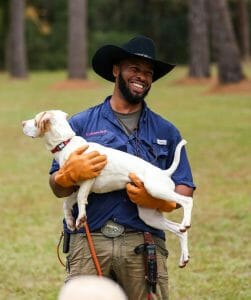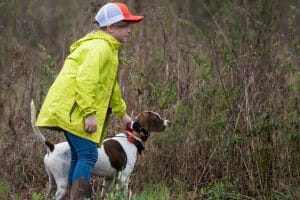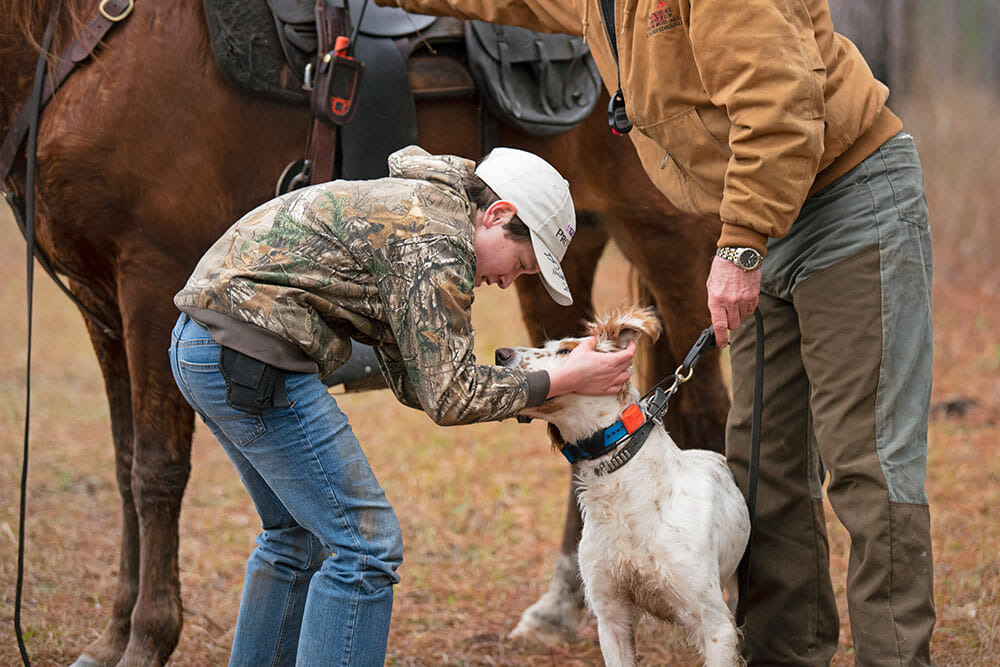Of all the post-covid lessons learned, the inestimable value of time outdoors was one of the greatest. As schools and businesses shuttered (some for longer than others), isolation grew and more and more children became consumed with life spent on a tiny screen. We are certainly seeing the damage done to developing brains done in this brief but impactful period of time. There is no doubt that children who had encouragement and access to safe places to play outside have thrived more than their peers. This is especially apparent in this corner of the world, where quail hunts and field trial handling is taking off with the next generation of sportsmen, faster than you can shout “Bird!”

Kevin’s Fine Outdoor Gear & Apparel
As author, artist, podcaster upland hunter and bird dog fanatic, The Sporting Life Notebook’s Durrell Smith, fervently concurs: “It’s an urgent matter that we take the time to recognize that one of the greatest responsibilities — in an age of increasing conservation and climate awareness — that we lend a giving and generous hand to the younger generations of outdoor kids and engage them in the lifestyle that we love so much and is so dear to our hearts.”
As founder and one of three directors of Youth Field Trial Alliance (an organization which has applied for its 501©3 non-profit status), Chris Mathan agrees. She will be the first to tell you about the positive benefits of the field trialing sport which has seen incredible growth in recent years:
- Promotes physical and mental health and wellbeing by having kids active and outdoors — and off their digital devices!
- Teaches responsibility through caring for and working with animals.
- Instills confidence and healthy competition while fostering real life social skills — friendship, cooperation, and sharing.
- Promotes a lifelong love of the outdoors, dogs, horses and wildlife and good sportsmanship.
- Engages young people in local community activities and builds their understanding and appreciation of longtime traditions.
- Nurtures an interest, support and involvement in wildlife conservation.
The timing around this organization’s formation is especially noteworthy. Since 2008, Mathan has been producing an on-line publication, Strideaway, dedicated to covering adult field trial events. Inspired by a growing interest and a surge in regional clubs hosting youth-centric events, she started the Youth Field Trial Alliance Facebook page in 2019, “to promote field trials and training days for youth handlers” across the country. She notes, “traditionally, kids would get involved in the sport when they’d attend clubs’ weekend events with their parents. Or plantation managers would bring their kids – the ones who grow up around bird dogs – would come to watch.”
Field trialing often takes place astride a horse and “when some parents learn their kid is interested in a sport where they need their own horse…” well, they might just balk. But field trialing can also be done on foot. No need to have your own horse to participate. “What we are trying to promote down here are trials where you don’t need a horse. We want them to get them hooked from the beginning.”
Naturally, the next question is, “Don’t you have to have a dog to do field trialing?” Field trial dogs are supreme athletic canines, with lineages that are as impressive as the rippling muscles and fierce focus each possesses. Mathan smiles as she says, “Not having a dog is NOT a barrier to entry for these kids. If they want to participate in field trialing, we will get them a dog (to participate with).” By way of example, in an event last fall, it was a retired all-age liver-and-white pointer named Belle who took home first place in the Tommy Traylor Memorial Youth Field Trial with her handler, Shelby Street. These retired pointers find new life working with youth handlers, making it a win-win situation, all the way around.

Chris Mathan Sporting Dogs
In years past, field trialing has been a male-dominated sport but there are growing ranks of female field trailers. Mathan says, “traditionally, this has been a very male-oriented sport. That had to do with fewer women at bird hunts or upland bird hunting, but that is changing. Yes, women have been involved in this sport which has been around since 1863, but now at least half of the kids in youth field trials, are girls.” She has been watching and observing many of these kids over the past four years and is astounded at their progress and growth. “There is a young woman from Moultrie, Daley Dalton, who I first met when she was 14 years old. When she began, she was so nervous and anxious but to see her now? This past spring, I watched her run a dog at the national amateur derby championship at Livingston Place and she is just filled with confidence.”
Durrell’s sentiments dovetail those: “The gains that are made when young stewards of the outdoors can experience a bird dog on point, practice animal husbandry, and learn about our impact on nature is not only exponential, but a revelation into the future of our joy.” Working his dogs with his own children, he has experienced these results firsthand: “To pass the knowledge and wisdom of wing-shooting and bird dogs from forefathers to the children of our futures is one of the greatest joys I’ve experienced in the Red Hills.”
To learn more about youth field trials and how you can support getting more youth involved in this precious time afield, go to YouthFieldTrialAlliance.org. To learn more about Durrell Smith’s work, go to TheSportingLifeNotbebook.com and MinorityOutdoorAlliance.org


 From murky farm ponds to pristine glacier-cut lakes and everything in between, Knox Daniels’ expertise stems from a lifelong fascination of water and the creatures that live in and around it. He recognizes and helps clients appreciate the value water features bring to a property. “My goal is to help buyers realize and sellers maximize the value different water bodies bring to a property, not only in a recreational sense, but also for social storm reasons.” After extensively traveling the country for collegiate BASS fishing tournaments, Knox graduated and worked for the Southeast’s finest fisheries and wildlife biologist, Greg Grimes. With Grimes’ company, AES, Knox managed many of the southeast’s finest private lake estate/impoundment properties, and learned the intricacies of upscale property management. Learning from Greg and other biologists, Knox honed in on the specific conditions and habitat needed for optimal gamefish growth in private lakes. He has also worked as a property manager on several thousand acres and for a commercial developer, facilitating the dirt work and builds of several apartment complexes, but his true passion has always been in the outdoors. “I’ve always had an insatiable fascination with ponds/lakes and am grateful to be able to help to place clients on the properties of their dreams and make their personal fisheries/wildlife goals reality with JKA.” – Knox Daniels
From murky farm ponds to pristine glacier-cut lakes and everything in between, Knox Daniels’ expertise stems from a lifelong fascination of water and the creatures that live in and around it. He recognizes and helps clients appreciate the value water features bring to a property. “My goal is to help buyers realize and sellers maximize the value different water bodies bring to a property, not only in a recreational sense, but also for social storm reasons.” After extensively traveling the country for collegiate BASS fishing tournaments, Knox graduated and worked for the Southeast’s finest fisheries and wildlife biologist, Greg Grimes. With Grimes’ company, AES, Knox managed many of the southeast’s finest private lake estate/impoundment properties, and learned the intricacies of upscale property management. Learning from Greg and other biologists, Knox honed in on the specific conditions and habitat needed for optimal gamefish growth in private lakes. He has also worked as a property manager on several thousand acres and for a commercial developer, facilitating the dirt work and builds of several apartment complexes, but his true passion has always been in the outdoors. “I’ve always had an insatiable fascination with ponds/lakes and am grateful to be able to help to place clients on the properties of their dreams and make their personal fisheries/wildlife goals reality with JKA.” – Knox Daniels Jason has been assisting landowners for the last 28 years in Georgia and South Carolina obtain achievements the owners did not realize were possible. His degree in Biology from Georgia Southern stemmed from the desire to know how things in nature work. His plantation roots began at just 16 years old outside of Albany, GA and the last 20 years were spent in the Lowcountry of South Carolina. His entire career has been spent developing a global approach to plantation management. That plan included sales. Sales is in Jason’s blood- his mom had a 45-year career as a real estate broker. After college, he chose to pursue his passion of making properties great. In 2011, Jason sold his first plantation. Since then, he has assisted buyers and sellers with over $20 million in sales while most of that time working as a full-time General Manager of a large Lowcountry plantation. Today, he is committed to using his unique skill set and experience to guide landowners through the many challenges of plantation ownership.
Jason has been assisting landowners for the last 28 years in Georgia and South Carolina obtain achievements the owners did not realize were possible. His degree in Biology from Georgia Southern stemmed from the desire to know how things in nature work. His plantation roots began at just 16 years old outside of Albany, GA and the last 20 years were spent in the Lowcountry of South Carolina. His entire career has been spent developing a global approach to plantation management. That plan included sales. Sales is in Jason’s blood- his mom had a 45-year career as a real estate broker. After college, he chose to pursue his passion of making properties great. In 2011, Jason sold his first plantation. Since then, he has assisted buyers and sellers with over $20 million in sales while most of that time working as a full-time General Manager of a large Lowcountry plantation. Today, he is committed to using his unique skill set and experience to guide landowners through the many challenges of plantation ownership.
 Bruce Ratliff is a retired elected official (Property Appraiser Taylor County). Bruce brings years of experience in ad valorem tax knowledge. His property tax background gives JKA Associates & clients a unique insight into the complicated tax process. Bruce held several positions in the Florida Association of Property Appraisers, including member of the Board of Directors, President, Vice-President and Secretary, and served on the Agricultural & Legislative Committees for the Association. The real estate business has been part of Bruce’s life since childhood. His mother, Shirley Ratliff owned Professional Realty of Perry, Florida and his father, Buster owned Ratliff Land Surveying which Bruce was General Manager of before his political career.
Bruce Ratliff is a retired elected official (Property Appraiser Taylor County). Bruce brings years of experience in ad valorem tax knowledge. His property tax background gives JKA Associates & clients a unique insight into the complicated tax process. Bruce held several positions in the Florida Association of Property Appraisers, including member of the Board of Directors, President, Vice-President and Secretary, and served on the Agricultural & Legislative Committees for the Association. The real estate business has been part of Bruce’s life since childhood. His mother, Shirley Ratliff owned Professional Realty of Perry, Florida and his father, Buster owned Ratliff Land Surveying which Bruce was General Manager of before his political career. Hailing from a long line of outdoorsmen, Tim learned a great deal from his father and grandfather. He saw first-hand what it means to be a good land steward. He believes land is so much more than a place to hunt, fish, and grow timber or crops. “It’s an identity, a resting place, a safe haven and a way of life, said Tim.” Tim’s family ties to Alabama run deep. During his grandfather’s first term, Governor James was responsible for signing into law Alabama’s first state duck stamp which helped to ensure funding for the procurement, development, and preservation of wetlands for migratory waterfowl habitat. He also established Alabama’s lifetime hunting license, so it is no surprise that Tim is an avid outdoorsman with a keen eye as to how best to improve habitat for the greater good of its wildlife.
Hailing from a long line of outdoorsmen, Tim learned a great deal from his father and grandfather. He saw first-hand what it means to be a good land steward. He believes land is so much more than a place to hunt, fish, and grow timber or crops. “It’s an identity, a resting place, a safe haven and a way of life, said Tim.” Tim’s family ties to Alabama run deep. During his grandfather’s first term, Governor James was responsible for signing into law Alabama’s first state duck stamp which helped to ensure funding for the procurement, development, and preservation of wetlands for migratory waterfowl habitat. He also established Alabama’s lifetime hunting license, so it is no surprise that Tim is an avid outdoorsman with a keen eye as to how best to improve habitat for the greater good of its wildlife. With Madison County roots, Lori grew up on her family farm at Pettis Springs along the historic Aucilla River. A love of the land was instilled in Lori very early on by her father who was a local farmer. Lori understands the importance of good land stewardship and has witnessed first-hand how her own father, a former 2-term member of the Florida House of Representatives whose district encompassed many rural counties of the Red Hills Plantation Region, with a little bit of sweat equity, so lovingly worked their own family land. These are core values she carries with her today, and nothing gives her more personal satisfaction than to represent some of the south’s best land stewards.
With Madison County roots, Lori grew up on her family farm at Pettis Springs along the historic Aucilla River. A love of the land was instilled in Lori very early on by her father who was a local farmer. Lori understands the importance of good land stewardship and has witnessed first-hand how her own father, a former 2-term member of the Florida House of Representatives whose district encompassed many rural counties of the Red Hills Plantation Region, with a little bit of sweat equity, so lovingly worked their own family land. These are core values she carries with her today, and nothing gives her more personal satisfaction than to represent some of the south’s best land stewards. Cole’s dedication to land management lies in his family roots. As a fourth-generation timber expert, Cole’s earliest memories were spent with his father managing timber investments. With a degree in Food Resource Economics from the University of Florida, Cole is the epitome of an up-and-coming leader. He grew up with a hands-on approach to learning land management and conservation and has spent the last 15 years learning every angle of the real estate and forest industry. Cole is a member of the Florida Forestry Association, Red Hills Quail Forever, Southeastern Wood Producers Association and he uses this platform as an advocate for landowners and their land investments. His family has dedicated the past 60 years to providing landowners in North Florida and South Georgia with professional land management services focused on improving and protecting one’s forestland and wildlife investment. In fact, their family business, M.A. Rigoni, Inc., was one of the first to introduce whole tree chipping to the Red Hills Region.
Cole’s dedication to land management lies in his family roots. As a fourth-generation timber expert, Cole’s earliest memories were spent with his father managing timber investments. With a degree in Food Resource Economics from the University of Florida, Cole is the epitome of an up-and-coming leader. He grew up with a hands-on approach to learning land management and conservation and has spent the last 15 years learning every angle of the real estate and forest industry. Cole is a member of the Florida Forestry Association, Red Hills Quail Forever, Southeastern Wood Producers Association and he uses this platform as an advocate for landowners and their land investments. His family has dedicated the past 60 years to providing landowners in North Florida and South Georgia with professional land management services focused on improving and protecting one’s forestland and wildlife investment. In fact, their family business, M.A. Rigoni, Inc., was one of the first to introduce whole tree chipping to the Red Hills Region. As a landowner of his own family farm, Lick Skillet, along with family land that has been passed down and enjoyed together at Keaton Beach for 40 years, Jon knows what it means to be a steward of the last best places. As a third-generation land broker with more than 30 years of experience in advising landowners in this niche, Jon is known for his innate ability to harvest a land’s unique intrinsic value. Touting several notable sales under his belt, Jon personally closed Rock Creek/Molpus – 124,000 acres of premium timberland at $142,000,000 – which was known as the largest timberland land sale in the Southeast for eight years running. He is a co-founding member of LandLeader and achieved the real estate industry’s highest honor, “2022 National Broker of the Year – Recreational Land Sales,” by the Realtors® Land Institute.
As a landowner of his own family farm, Lick Skillet, along with family land that has been passed down and enjoyed together at Keaton Beach for 40 years, Jon knows what it means to be a steward of the last best places. As a third-generation land broker with more than 30 years of experience in advising landowners in this niche, Jon is known for his innate ability to harvest a land’s unique intrinsic value. Touting several notable sales under his belt, Jon personally closed Rock Creek/Molpus – 124,000 acres of premium timberland at $142,000,000 – which was known as the largest timberland land sale in the Southeast for eight years running. He is a co-founding member of LandLeader and achieved the real estate industry’s highest honor, “2022 National Broker of the Year – Recreational Land Sales,” by the Realtors® Land Institute.